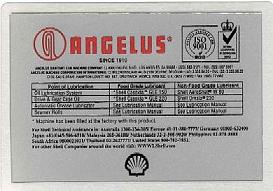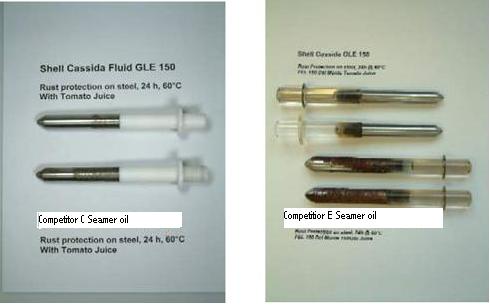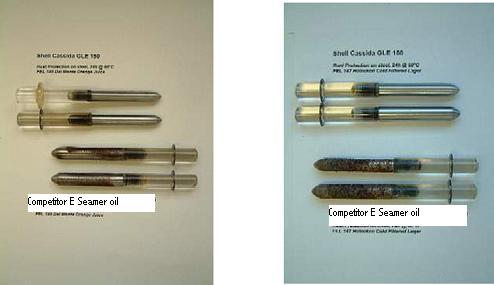 download article
download articleSafer Seaming With Food Grade Lubricants
Article index
 | Non-Food Grade Risks | |
 | A Costly Crisis | |
 | Food Grade Safety | |
 | Canning Without Corrosion | |
 | Protecting Process, Product and Brand |
Unlike the threat of contamination due to poorly seamed cans, lubricant contamination does not offer the same warning signals; yet it can pose a greater risk to food quality and safety. Used to ensure the smooth and efficient running of can seamers, lubricants and greases can help to improve the regularity of the seam, increasing food safety. Better still, effective lubrication helps to reduce part corrosion, minimising the risk of food contamination through metal chips or rust. However, the use of non-food grade lubricants can quickly negate these operational and safety benefits, which is why Shell lubricants companies have developed a range of food grade can seaming lubricants and greases.
Non-Food Grade Risks
Many consumers would probably be shocked to learn that engine oils may have been used to seal their tinned foods. In many cases though, this is often the truth, as, for the past 40 years, general aviation piston engine oils have been widely used throughout the industry for lubricating can seamers. The oils have helped operators to overcome key lubrication challenges, such as high operating temperatures and speeds, enabling them to successfully lubricate the can seamers’ moving metal components and protect against expensive part wear and unscheduled stoppages.As most can seamers lose oil during operation, non-food grade lubricants pose a very real threat to food safety. Total loss can seamers consume approximately eight litres (two US gallons) of lubricant per day, while recirculating systems can use up to four litres (around one US gallon) per day. Excess lubricant and grease can collect above the open cans on the seamers’ roll bearings or upper turret. This increases the risk of the lubricant and grease dripping or being flung off the seamers’ moving parts. If a non-food grade lubricant or grease enters the can before or while it is being seamed, the product is considered ‘adulterated’ and is therefore unfit for sale or consumption.
A Costly Crisis
A contamination incident at this point can prove a major problem for operators. Whole batches of products and packaging have to be destroyed and production lines stopped for long periods of time as can seamers are cleaned. Delays in production can lead to missed delivery deadlines, straining customer relationships and threatening repeat purchasing. Worse still, as the lubricant is seamed within the can, the contamination incident may go unnoticed until the product is on the shelf, endangering consumer health and welfare. By this time, further costs can be incurred, because of expensive product recalls and damage to hard-earned brand reputations.Food Grade Safety
Operators can significantly increase food safety and minimise the impact of contamination with the use of H1 food grade can seamer lubricants and greases. Food grade products such as Shell FM Gear Oil TLS 150, Shell Cassida ® Fluid GLE 150 and Shell Cassida Greases, have been developed specifically for use in can seamers and have been formulated using a system of approved additives and base fluids. This composition means that the lubricants and greases are colourless, tasteless and odourless, and will not contaminate food if present in quantities less than the US FDA’s maximum permitted level for NSF H1 lubricants of 10 parts per million.As oil in a total loss lubrication can seamer only stays in the machine for a relatively short period of time, Shell FM Gear Oil TLS 150 is based on a technical H1 white oil. This enables operators to effectively meet the continuous lubrication demands of the total loss system and protect the seamer’s components against accelerated wear, while reducing the threat of contamination through lubricant being flung off or dripping from the seamer’s components. For operators using recirculating systems, a synthetic food grade gear lubricant such as Shell Cassida GLE 150 can be used to maintain high levels of food safety and operational efficiency. The food grade qualities of Shell Cassida Grease RLS 1 and Cassida Grease RLS 0 will help to minimise the impact of contamination caused by grease drips from the seamer roll. Leading original equipment manufacturer, Angelus, has approved both Shell Cassida Grease RLS 1 and Cassida Grease RLS 0 for use in its can seamers.

Safety and Performance - Shell Cassida products are the only food grade lubricants that Angelus recommends for use in its can seamers
Canning Without Corrosion
High-quality food grade can seamer lubricants can also offer excellent lubrication even in the presence of juice, water or food sauce. An effective canning lubricant will have high water-handling capabilities, allowing it to absorb free water. The removal of the water from the seamer reduces contact staining which can lead to heavy pitting (a common cause of bearing failure), rust and corrosion. While this enables operators to maintain continuous and reliable seamer performance, it also further improves food safety levels.
Heavy pitting caused by contact staining after water ingression. Product: Tomato juice

And in Orange juice and Beer
Protecting Process, Product and Brand
Open cans, high lubricant consumption and fast-moving can seamer components, all make the risk of accidental lubricant contamination during canning a constant threat. By using high quality, food grade, H1 approved can seaming lubricants and greases, operators no longer need to compromise food safety for lubricant performance. Effective food grade lubrication will help operators to improve can seamer cleanliness and achieve better seaming – having a positive impact on equipment uptime and the flow of cans down the production line – while helping reduce the adverse impact of contamination.For more information: FUCHS LUBRICANTS GmbH
 back to top
back to top


 companies
companies

